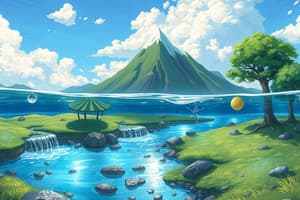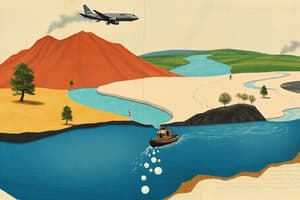Podcast
Questions and Answers
What percentage of the Earth's water is fresh?
What percentage of the Earth's water is fresh?
- 3% (correct)
- 97%
- 75%
- 50%
What process changes water into gas?
What process changes water into gas?
- Evaporation (correct)
- Cloud Formation
- Condensation
- Precipitation
What is the main salt in seawater?
What is the main salt in seawater?
- Calcium Chloride
- Magnesium Sulfate
- Potassium Nitrate
- Sodium Chloride (correct)
What is the term for water falling from the clouds to the ground?
What is the term for water falling from the clouds to the ground?
What is the term for water changing from gas to liquid?
What is the term for water changing from gas to liquid?
What percentage of the Earth's water is salty?
What percentage of the Earth's water is salty?
What is the purpose of the sun in the water cycle?
What is the purpose of the sun in the water cycle?
What is formed when water vapour turns back into liquid water?
What is formed when water vapour turns back into liquid water?
What is responsible for making rainwater slightly acidic?
What is responsible for making rainwater slightly acidic?
Flashcards are hidden until you start studying
Study Notes
Water Coverage and Types
- Two-thirds of the Earth's surface is covered in water
- 97% of the Earth's water is salty seawater, leaving 3% as fresh water
The Water Cycle
- The water cycle is powered by the sun
- Steps in the water cycle:
- Evaporation: Sun heats seawater, turning it into water vapour
- Condensation: Water vapour turns back into liquid water, forming clouds
- Precipitation: Water falls from clouds as rain, sleet, hail, or snow
- Runoff: Water flows into streams, rivers, and eventually back to the sea
Freshwater and Seawater
- Rainwater is slightly acidic due to carbon dioxide and sulphur dioxide
- Acidic rain absorbs mineral salts, including sodium and chloride, from rocks
- Dissolved salts, particularly sodium chloride, make seawater salty
- Rainwater carries dissolved salts to rivers, streams, and eventually the sea, making seawater salty
Studying That Suits You
Use AI to generate personalized quizzes and flashcards to suit your learning preferences.




